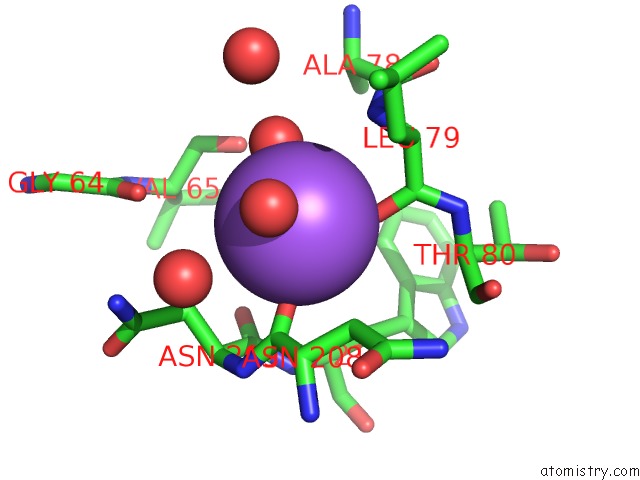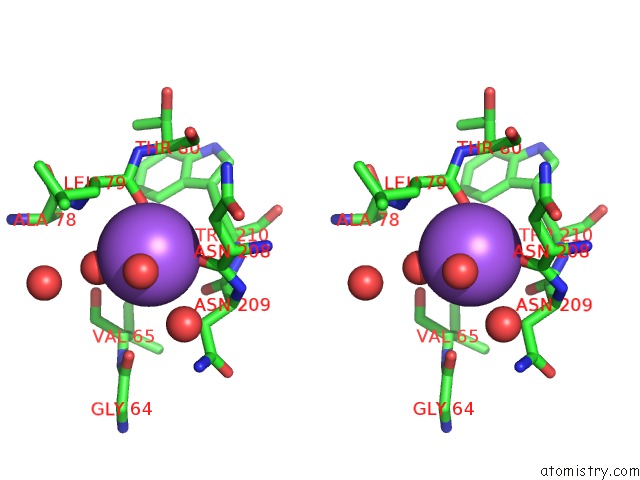Sodium »
PDB 4gg1-4gxi »
4gno »
Sodium in PDB 4gno: Structure of Rat Cytosolic Pepck LD_3G in Complex with Beta- Sulfopyruvate and Gtp
Enzymatic activity of Structure of Rat Cytosolic Pepck LD_3G in Complex with Beta- Sulfopyruvate and Gtp
All present enzymatic activity of Structure of Rat Cytosolic Pepck LD_3G in Complex with Beta- Sulfopyruvate and Gtp:
4.1.1.32;
4.1.1.32;
Protein crystallography data
The structure of Structure of Rat Cytosolic Pepck LD_3G in Complex with Beta- Sulfopyruvate and Gtp, PDB code: 4gno
was solved by
T.A.Johnson,
T.Holyoak,
with X-Ray Crystallography technique. A brief refinement statistics is given in the table below:
| Resolution Low / High (Å) | 34.30 / 1.50 |
| Space group | P 21 21 21 |
| Cell size a, b, c (Å), α, β, γ (°) | 60.792, 84.111, 118.564, 90.00, 90.00, 90.00 |
| R / Rfree (%) | 16.7 / 19.4 |
Other elements in 4gno:
The structure of Structure of Rat Cytosolic Pepck LD_3G in Complex with Beta- Sulfopyruvate and Gtp also contains other interesting chemical elements:
| Manganese | (Mn) | 2 atoms |
Sodium Binding Sites:
The binding sites of Sodium atom in the Structure of Rat Cytosolic Pepck LD_3G in Complex with Beta- Sulfopyruvate and Gtp
(pdb code 4gno). This binding sites where shown within
5.0 Angstroms radius around Sodium atom.
In total only one binding site of Sodium was determined in the Structure of Rat Cytosolic Pepck LD_3G in Complex with Beta- Sulfopyruvate and Gtp, PDB code: 4gno:
In total only one binding site of Sodium was determined in the Structure of Rat Cytosolic Pepck LD_3G in Complex with Beta- Sulfopyruvate and Gtp, PDB code: 4gno:
Sodium binding site 1 out of 1 in 4gno
Go back to
Sodium binding site 1 out
of 1 in the Structure of Rat Cytosolic Pepck LD_3G in Complex with Beta- Sulfopyruvate and Gtp

Mono view

Stereo pair view

Mono view

Stereo pair view
A full contact list of Sodium with other atoms in the Na binding
site number 1 of Structure of Rat Cytosolic Pepck LD_3G in Complex with Beta- Sulfopyruvate and Gtp within 5.0Å range:
|
Reference:
T.A.Johnson,
T.Holyoak.
The {Omega}-Loop Lid Domain of Phosphoenolpyruvate Carboxykinase Is Essential For Catalytic Function. Biochemistry V. 51 9547 2012.
ISSN: ISSN 0006-2960
PubMed: 23127136
DOI: 10.1021/BI301278T
Page generated: Mon Oct 7 15:37:18 2024
ISSN: ISSN 0006-2960
PubMed: 23127136
DOI: 10.1021/BI301278T
Last articles
Zn in 9J0NZn in 9J0O
Zn in 9J0P
Zn in 9FJX
Zn in 9EKB
Zn in 9C0F
Zn in 9CAH
Zn in 9CH0
Zn in 9CH3
Zn in 9CH1